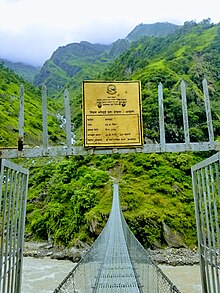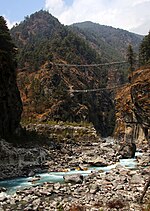List of bridges in Nepal
This list of bridges of Nepal draws up an inventory of the remarkable bridges of Nepal, as well by their dimensional characteristics, as by their architectural or historical interest.
The long suspension bridges of Nepal
In 2015, Nepal had a total road network of 80,078 kilometres (49,758 mi) of which 53,143 kilometres (33,022 mi) are local rural roads, of these, only 1,697 kilometres (1,054 mi) has been black-topped.[1] Modern roads are few and mostly concentrated on the Terai plain, the area stretching along the border with India and which accounts for nearly half of the country's population. In 2020, there is only one railway line of 59 kilometers, also located near India and the capital Kathmandu has no railway connection.[2] The population is essentially rural in this region at the foot of the Himalayas, but the steep reliefs are a brake on the development of the local populations who are already among the poorest in the world.


Until the 1950s, the whole country with the exception of the Terai was provided only with trails for a large part of the territory, some essential trade routes had been established since the beginning of the 20th century, despite the isolation of the Nepal. Louis Harper introduced the first modern suspension footbridges to Nepal in the late 1890s, he had improved the system in the United Kingdom from wooden pylons to steel lattice pylons, they were pre-fabricated in Scotland and shipped to site for assembly. At least 4 bridges of this type remain in service in Nepal today.[3] This system was unfortunately not effective and failed to meet significant demand.
All these constraints led the government to create the Suspension Bridges Division in 1964 (replaced by the Trail Bridge Section in 2001) which studied with Swiss engineers a model of durable, easy-to-build simple suspension bridge, adapted to the Nepalese relief and therefore to large spans ranging from 120 to 350 metres (390 to 1,150 ft), and a whole first generation of trail bridges was born on the main axes, with up to 30 bridges built per year. Under an increasingly strong demand, a second generation of bridges had developed with economic and environmental stakes, these bridges are optimized to be built with local materials and carried out by a local workforce in order to extend this system across the country. They will nevertheless have shorter spans than the first generation bridges, in the order of 40 to 120 meters.
By 2004, more than 3000 suspension bridges have thus been built on the Nepalese landscape including 2230 bridges through Swiss support with an overall length of more than 180 kilometres (110 mi).[4] Two types of bridges have been built: 580 long-span trail bridges with lengths ranging from 120 to 350 metres (390 to 1,150 ft) on the main trails under the responsibility of the Department of Local Infrastructure Development and Agricultural Roads and 1650 short-span community bridges up to 120 metres (390 ft) in length, built by the communities themselves under the responsibility of User Committees.[5] In September 2015, a total of 6000 completed trail bridges has been celebrated.[6]
But the needs are still numerous and signs of weakness are beginning to appear, it is estimated that 200 the number of bridges require heavy work, even replacement (statistics mid-2004). Some footbridges are built on great heights in order to fight against flooding during the monsoon, 14 bridges were destroyed during the glacial break-up of Digcho in the Sagarmatha area in 1985. This phenomenon, also called jökulhlaup, is caused by the rupture of a glacier and causes sudden and devastating floods. The devastated bridges were later rebuilt on higher levels.
They are rediscovered today by tourists during organized backpackings on the footpaths of Everest, Annapurna, the Kathmandu Valley and other sites along Nepal.
Historical and architectural interest bridges
Among the notables bridges of Nepal, we can mention the Dodhara Chandani Bridge which has the originality of being composed of 4 successive suspension bridges with three spans, and a total of 8 large steel truss pylons, which spans nearly 1,500 meters.[7] Its four main spans have very large arrows and each is held by lateral support cables. The bridge is designed as a pedestrian bridge, but bicycles and motorcycles can use the bridge as well. There is enough room so that motorcycles can pass even if they are fully loaded. All traffic travels on the left-hand side, as everywhere else in Nepal.
The bridges presented here are initially sorted by date of commissioning, they thus retrace part of the history of transport in Nepal and the various developments that led to the structures that can be seen today.
Major road bridges
Nepal's largest road bridge, the Karnali Bridge, was designed by Steinman, Boynton, Gronquist & Birdsall of USA, constructed by Kawasaki Heavy Industries of Japan[13] and funded by the World Bank.[14] It is part of the country's largest highway, the Mahendra Highway H01, which crosses the Terai region from east to west and over Nepal's longest and widest river, the Ghaghara (also called Karnali) which ends in the Ganges. The Karnali Bridge is the only road bridge with a span of more than 300 meters in Nepal, the H01 highway like the other highways in the country, avoids major obstacles as much as possible, such as the many rivers resulting from melting snow of the Himalayas and overly mountainous areas which would require much more expensive infrastructure. The very underdeveloped railway network is an additional reason for the scarcity of major bridges other than footbridges in Nepal. This table presents the structures with spans greater than 100 metres (330 ft) (non-exhaustive list).
Major footbridges
This table presents suspension footbridges with spans greater than 300 metres (980 ft) (non-exhaustive list).
See also
- Transport in Nepal
- Rail transport in Nepal
- List of roads in Nepal
- Geography of Nepal
- List of rivers of Nepal
- Annapurna Circuit
Notes and references
- Notes
- ^ According to the sources, the span would be between 490 and 520 metres (1,610 and 1,710 ft)[24][25] and the height between 200 and 228 metres (656 and 748 ft).
- ^ The given height varies between 117 and 155 metres (384 and 509 ft).[26][27]
- ^ Also known as Badagaun-Kaiyan Trail Bridge, the height is reported between 117 and 157 metres (384 and 515 ft).[30][31]
- ^ According to the sources, the height would be between 117 and 135 metres (384 and 443 ft).[32][33]
- Nicolas Janberg. "International Database for Civil and Structural Engineering". Structurae.com.
- Others references
- ^ "Total road length crosses 80,000km". The Himalayan Times. July 13, 2015. Retrieved December 12, 2022.
- ^ "Department of Railways". Dorw.gov.np - Ministry of Physical Infrastructure and Transport - Government of Nepal. Retrieved December 12, 2022.
- ^ "Harper Bridges - Introduction". Harperbridges.com. Archived from the original on February 7, 2012.
- ^ Asia Brief - Trail Bridges In Nepal, 2006, p.1
- ^ Asia Brief - Trail Bridges In Nepal, 2006, p.2
- ^ Sapkota, 2017, p.140
- ^ a b "Program & Projects - Dodhara Chandani Multispan Pedestrian Bridge". Dolidar.gov.np. Department of Local Infrastructure Development and Agricultural Roads, Government of Nepal. Archived from the original on August 2, 2007.
- ^ "New Bridges Move Mountain People". Agenda. Vol. 1 & 2. Press and Publications Division, Office of Public Affairs, Agency for International Development. 1978. p. 15.
- ^ "Sagarmatha National Park". Whc.unesco.org. Retrieved December 12, 2022.
- ^ Gautam, Upendra (March 2003). South Asia and China: Towards Inter-Regional Cooperation (PDF). Kathmandu, Nepal: China Study Center. p. 129. ISBN 99933-53-33-7. Retrieved December 12, 2022.
- ^ "Sino-Nepal 'friendship bridge' reconstruction begins after taking 2015 quake damage". Devdiscourse.com. November 17, 2018. Retrieved December 12, 2022.
- ^ "रुरु क्षेत्र रिडीमा १४ करोडको तीनमुखे पुल निर्माण सकिन लाग्यो" [The construction of a three-way bridge worth 140 million has been completed in Riddi, Ruru area]. Globalaawaj.com (in Nepali). Retrieved December 12, 2022.
- ^ a b Shrestha, Bipin; Tuladhar, Roshan (December 2012). "The response of Karnali Bridge, Nepal to near-fault earthquakes". Proceedings of the Institution of Civil Engineers - Bridge Engineering. 165 (BE4): 223–232. doi:10.1680/bren.9.00037. ISSN 1478-4637. Retrieved December 12, 2022.
- ^ Dave Reed; James McConnachie (2015-07-01). "The western terai- the far west". The Rough Guide to Nepal. Rough Guides UK. pp. 276–277. ISBN 978-0-241-23810-3.
- ^ Shrestha, Jagat Kumar (April 2016). "Effect of Modification of Deck Properties on Suspension Bridges". Journal of the Institute of Engineering. Vol. 12. pp. 39–50.
{{cite book}}:|website=ignored (help) - ^ Jaishi, Bijaya (March 2021). "Dudhkoshi Motorable Suspension Bridge". Newsletter - Department of Roads. Vol. 25. Lalitpur, Nepal. pp. 3–6.
{{cite book}}:|website=ignored (help)CS1 maint: location missing publisher (link) - ^ "Newly constructed bridge over Dudhkoshi links eastern hill districts". The Kathmandu Post. November 24, 2017. Retrieved December 12, 2022.
- ^ a b Bridges - Spanning the world since 1919 (PDF). December 2014. Retrieved December 12, 2022.
{{cite book}}:|website=ignored (help) - ^ "120 metre Arun River Steel Truss Bridge". Steel-bridges.com - John REID & Sons Ltd. Retrieved December 12, 2022.
- ^ "Sabha Khola". Steel-bridges.com - John REID & Sons Ltd. Retrieved December 12, 2022.
- ^ Jaishi, Bijaya (August 2021). "Design and Construction of Mugling Deck Arch Bridge" (PDF). Newsletter - Department of Roads. Vol. 26. Lalitpur, Nepal. pp. 1–4.
{{cite book}}:|website=ignored (help)CS1 maint: location missing publisher (link) - ^ "World's longest suspension bridge over Kaligandaki River given name". Nepalnews.com. Retrieved December 12, 2022.
- ^ "Gandaki Golden Footbridge". Highestbridges.com. Retrieved December 12, 2022.
- ^ a b "Kushma Bungy Footbridge". Highestbridges.com. Retrieved December 12, 2022.
- ^ a b "Kushma Bungee Jump". Kushmabungeejump.com. 3 November 2020. Retrieved December 12, 2022.
- ^ a b "Kushma Mudikuwa Footbridge". Highestbridges.com. Retrieved December 12, 2022.
- ^ "म्याग्दीको बेगखोलामा मुलुककै लामो झोलुङ्गे पुल" [The country's longest suspension bridge at Begkhola in Myagdi]. Ghatanarabichar.com (in Nepali). Retrieved December 12, 2022.
- ^ Nepal Trail Bridge Record, p.36
- ^ Nepal Trail Bridge Record, p.29
- ^ a b "Kushma Balewa Footbridge". Highestbridges.com. Retrieved December 12, 2022.
- ^ "पर्वतमा लामा र अग्ला पुल बनाउने होड" [A bid to build a long and high bridge in the mountains]. Ghatanarabichar.com (in Nepali). Retrieved December 12, 2022.
- ^ a b "Kushma Gyadi Footbridge". Highestbridges.com. Retrieved December 12, 2022.
- ^ "मुलुककै लामा र अग्ला झोलुङ्गे पुल हेर्न पर्यटकको घुइँचो" [Tourists flock to see the longest and highest suspension bridge in the country]. Purbelinews.com (in Nepali). Retrieved December 12, 2022.
- ^ Nepal Trail Bridge Record, p.80
- ^ a b Nepal Trail Bridge Record, p.54
- ^ Nepal Trail Bridge Record, p.20
Further reading
- Harper, Douglas (2015). River, Railway and Ravine: Foot Suspension Bridges for Empire. History Press. ISBN 978-0-7509-6213-1.
- Trail Bridge Strategy 2006 (PDF). Lalitpur, Nepal: Ministry of Local Development, Government of Nepal. Archived from the original (PDF) on October 15, 2021.
{{cite book}}:|website=ignored (help) - "Nepal Trail Bridge Record" (PDF). Dolidar.gov.np. May 2011. Archived from the original (PDF) on January 25, 2020.
- Sapkota, Niraj (2017). "Trail Bridges In Nepal: Bridges To Prosperity". International Journal of Bridge Engineering (IJBE). Vol. 5. pp. 139–147.
{{cite book}}:|website=ignored (help) - "Asia Brief - Trail Bridges In Nepal: Partnership Results" (PDF). Eda.admin.ch. SDC Swiss Agency for Development and Cooperation - East Asia Division. July 2006.
- "Nepal - Trail Bridges for Safe Routes". Helvetas.org.
External links
- "Motorable Locals Roads Bridge Programme". lrbpnepal.org. Government of Nepal.
- "Nepal Trail Bridges". Nepaltrailbridges.org.np.
- "Ropeway Nepal". ropewaynepal.com.
- "Bridges in Nepal". Harperbridges.co.uk.
- Denenberg, David. "Suspension Bridges of Nepal". bridgemeister.com.
- Sakowski, Eric. "Category: Bridges in Nepal". Highestbridges.com.










